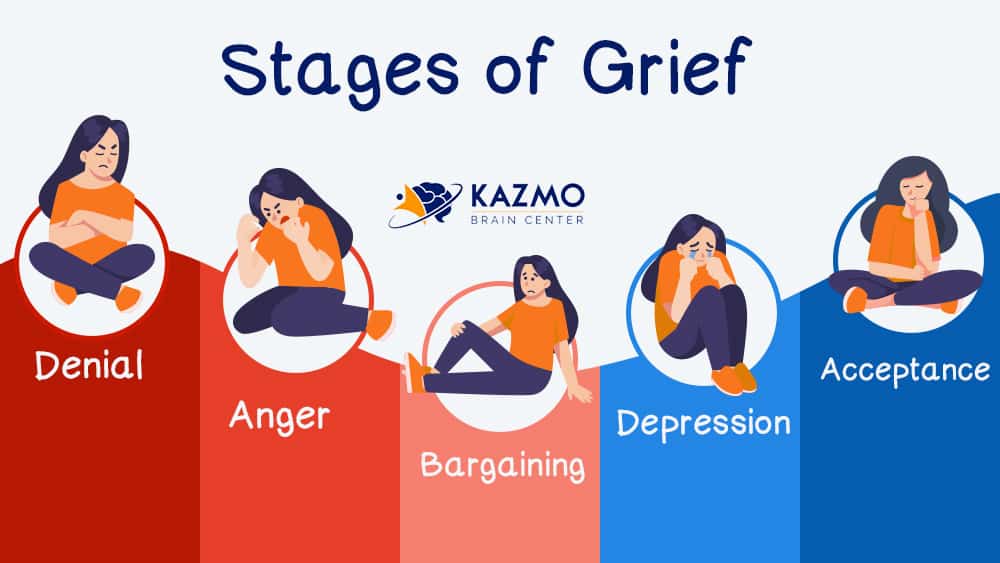What is Grief?
Grieving is an emotional concern associated with a person experiencing a significant loss in their lives. The loss can include the death of a loved one, being fired from a job, divorce or separation or any other event that involves a significant change in the person’s life. Grief often occurs when the change has happened suddenly, not allowing the person to mentally and emotionally prepare for the transition, and when the change has happened at a moment in the person’s life where the transition was unexpected. For example, a person may experience more severe grief due to the loss of a loved one who passed suddenly versus when the person was ill and there was time to mentally/emotionally prepare for the death. There are no specific rules, patterns, or expectations when it comes to grief. The one commonality is that everyone experiences grief very differently.
What Are the Stages of Grieving?
Your emotions may occur in stages, you can’t control the process, however, it’s useful to understand your feelings. Everyone unexpectedly experiences grief, but the common link in grief for people is the presence of grief stages. So what are the stages of grief:

Stage 1- Denial
When you first learn of a loss, it’s natural to deny, “This is impossible.” or ”this is not happening to me” You may feel stunned or numb. It is a defense method that the brain creates to be able to deal with loss.
Examples of the Denial Stage
- Breakup or divorce: “he/she’s just upset. we will be together tomorrow.”
- Job loss: “My boss was mistaken. He’ll call tomorrow to say: I’m sorry. I want you to go back to your job.”
- Passing of a friend or family member: “She’s not gone. she’s still alive.”
- Terminal illness diagnosis: “This isn’t happening to me. The results aren’t right.”
Stage 2- Anger
As reality sets in, you’re faced with the pain of your loss. You may feel disappointed and powerless. These emotions later transform into anger. You might direct it toward other people, for example, the person who passed on, your ex, or your old boss. You may even aim your anger at inanimate objects, a higher power or life in general.
Examples of the Anger Stage
- Breakup or divorce: “I hate him! He’ll regret leaving me!”
- Job loss: “They’re horrible bosses. I hope they fail.”
- Death of a loved one: “If she cared for herself more, this wouldn’t have happened.”
- Terminal illness diagnosis: “Where is God in this? How dare God to let this happen!”
Stage 3- Bargaining
During this stage, you dwell on what you could’ve done to prevent the loss. Common thoughts are “If only…” and “What if…” You may also try to strike a deal with a higher power, or promise to God.
Bargaining is a line of defense against the emotions of grief. It helps you postpone the sadness, confusion, or hurt.
Examples of the Bargaining Stage
- Breakup or divorce: “If only I had spent more time with her, she would have stayed.”
- Job loss: “If only I worked more weekends, they would have realized my commitment.”
- Death of a loved one: “If only I had called her that night, she wouldn’t be gone.”
- Terminal illness diagnosis: “If only we had gone to the doctor sooner, we could have stopped this.”
Stage 4- Depression
Whereas anger and bargaining can feel very “active,” depression may feel like a “calm” phase of pain. Signs of depression include crying, sleep issues, and a decreased appetite. You may feel overwhelmed, regretful, and lonely.
Be that as it may, on the off chance that you feel stuck here or can’t move past this phase of misery, talking with a psychological well-being master at Kazmo Brain Center, Frisco can help you work through this period of coping.
Examples of the Depression Stage
- Breakup or divorce: “Why do I continue my life?”
- Job loss: “I don’t have any idea how to go ahead from here”
- Death of a loved one: “What am I without her?”
- Terminal illness diagnosis: “My entire life arrives at this horrible end.”
Stage 5- Acceptance
Acceptance is not necessarily a happy or uplifting stage of grief. It doesn’t mean you’ve moved past the grief or loss. It does, however, mean that you’ve accepted it, and you’re ready to begin pushing ahead with your life.
Examples of the Acceptance Stage
- Breakup or divorce: “in the end, this was the right choice for me.”
- Job loss: “I’ll be able to find a way forward from here.”
- Death of a loved one: “I am so lucky to have had so numerous awesome years with him, and he will consistently be in my recollections.”
- Terminal illness diagnosis: “I have the opportunity to tie things up and make sure I get to do what I want in these final weeks and months.”
Everyone goes through these stages in their way. You may go back and forth between them, or skip one or more stages altogether. Reminders of your loss, like the anniversary of a death or a familiar or the song can trigger the return of grief.
What are the Symptoms of Grief?
The symptoms of grief also vary widely. Some people may demonstrate the more classic signs or symptoms, such as sadness, low mood, loss of interest in activities, and frequent crying spells. Other common symptoms include withdrawing from others, refusing to talk about the loss, feelings of guilt or blaming the self for the loss, and anger/irritability. Symptoms like eating disorders, difficulty sleeping, Aches, pains, Insomnia, are common; however, for some people, grief feelings can cause excessive eating and sleeping.
How Long will Grief Take?
There’s no “normal” amount of time to grieve. Your grieving process depends on some things, like your personality, age, beliefs, and support network. The type of loss is also a factor. For example, chances are you’ll grieve longer and harder over the sudden death of a loved one than, say, the end of a romantic relationship.
With time, the sadness eases. You’ll be able to feel happiness and joy along with grief. You’ll be able to return to your daily life.
Do I Need Professional Help?
In some cases, grief doesn’t get better. You may not be able to accept the loss. Doctors call this “complicated grief.” Talk to your doctor if you have any of the following:
- Trouble keeping up your daily activities, like going to work
- Feelings of depression
- Thoughts that life isn’t worth living
- Any inability to stop blaming yourself
- Neglect of self-care
A therapist can help you explore your feelings. They can also teach you coping skills and help you manage your grief. If you’re depressed, a doctor may be able to prescribe medicines to help you feel better. A therapist can also help you with grief counseling.
Steps to Help You Cope With Grief
When you’re in deep, emotional grief, it can be tempting to try to numb your feelings with drugs, alcohol, food, or even work. But be careful. These are temporary escapes that won’t make you heal faster or feel better in the long run. They can lead to addiction, depression, anxiety, substance abuse, or even an emotional breakdown.
Instead, try these things to help you come to terms with your loss and begin to heal:
- Give yourself time: Acknowledge your feelings and know that grieving is a process, and accept that grief will pass over time.
- Talk to others: Spend time with friends and family. Don’t isolate yourself.
- Take care of yourself: Exercise regularly eats well, and get enough sleep to stay healthy and energized.
- Return to your hobbies: Get back to the activities that bring you joy.
- Join a support group: Speak with others who are also grieving. It can help you feel more connected.
Just Remember…
Grief is a temporary emotion that will pass…
If you decide you need help coping with the feelings and changes, a mental health professional at Kazmo Brain Center is a good resource for vetting your feelings and finding a sense of assurance in these very heavy and weighty emotions.
Request an Appointment at Kazmo Brain Center, and our professional team will be with you and help you to overcome your feelings of grief.
Resources:
healthline.com
webmd.com



